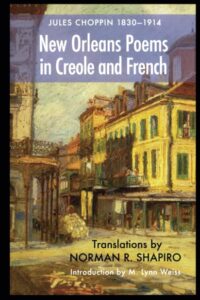Poet Jules Choppin retold fables and celebrated a bayou
When you are born and grow up in a state that has parishes instead of counties, whose legislature was required to write laws in both French and English as late as 1911, whose legal system is based on Napoleonic Code, and where Mardi Gras is an official state holiday, you gradually realize that you come from a very different place.
Louisiana is an unusual state. North Louisiana, where my father grew up, could pass for East Texas or Mississippi; it’s Bible Belt country. My mother’s family was a combination of German immigrants and Cajuns from south-central and southwest Louisiana. I grew up in New Orleans, where people’s accents could pass for Brooklynese. I had close relatives who spoke German, Cajun French, and English. My mother didn’t go grocery shopping; she “made groceries.”
When you’re a child, however, all of that seems normal. It’s your day-to-day experience. Only when you grow up and move away do you realize how strange it all sounds — and how difficult it can be to explain to people not from Louisiana.
My childhood and family experiences came back in a rush when a friend handed me a copy of New Orleans Poems in Creole and French by Jules Choppin (1830-1914). Choppin was born on a cousin’s sugar plantation in St. James Parish, upriver from New Orleans and part of what is known as both the German Coast and the Acadian Coast, both associated with immigrant groups in the 18th century. Known today for the oil refineries and chemical plants dotting the banks of the Mississippi River, the parish also includes some of the state’s most famous plantation homes, like Oak Alley. Before the Civil War, this was one of the wealthiest places in the United State in per capita income; after the war, it was one of the poorest.

Choppin published his poems in local literary publications and French-language newspapers in Louisiana, which were common through the 19th century. This collection of his poetry almost seems like two books of very different poems. The first part is composed of poems written in French Creole, while the second part contains poems in French. Both sections pair the poems with English translations by Norman Shapiro (died 2020), former professor of romance languages and literature at Wesleyan University, who had done extensive research into French Creole literature.
Most of the French Creole poems are retellings of Aesop’s Fables, like “The Tortoise and the Hare” and “The Ant and the Grasshopper.” The English translations made me grin; they sound just like the aunts and uncles from my childhood. To read them, you simply have to go with the flow and forget about things like grammar, syntax, and punctuation.
The Oyster and the Adversaries
Two friend go walk one day by water, see
Oyster on ground, same time… One say: “That be
For me!” And go make grab… Other, him so
Angry, him say: “Oh?” Ready come to blow…
Then judge come by, run up, and him say: “Drat!
No need you two go fight like dog and cat!
Me know you just find oyster. But do better
Wait, and me tell you who, which one go get her…”
Then him crack oyster, swallow, one two three,
And say: “Me judge, so oyster be for me!
But me no want you think me snake from hell,
So here! Me give you each one nice oyster shell.”
Moral
Never ask judge decide! Judge all got knack
Steal everything, even old shirt off back!
Always you lose, no matter what. So then,
Better make peace… Later, go fight again.
You catch the flow of the language, at least in English. You also catch the traditional Louisiana distrust of authority. And you also see the rather wry humor behind it all, the same kind of humor you find in Cajun Night Before Christmas, which I regularly read to both of my sons when they were children (including the accent).
The poems by Choppin in French are very different. It’s as if the fun poems are written in French Creole and the more serious saved for French. He includes several religious poems, but the majority are about a bayou, of all things.
I grew up knowing the Bayou St. John as a body of water stretching from Lake Pontchartrain to Esplanade Avenue, the northern boundary of the official French Quarter. It is a natural body of water, tamed over the centuries, that originally served as a rather extensive drainage system for the swampy land that was a good portion of New Orleans. It also afforded a route for trappers between the lake and the Mississippi River. It’s had a colorful history, including a channel for small boats and freight as well as one part associated with the voodoo activities of Marie Laveau.
For Choppin, “Bayou St. Jean” was an inspiration and almost a muse. He heard its bells, he knew its rituals, and he understood its place in area history and in people’s imaginations. And he wrote about it.
Still the Old Bayou
I love to see it thus, silent, at rest,
Reflecting heaven’s expanse over its breast,
Amid its waters. There, each star in place:
Orion, Venus, mirrored… And my face
Turned toward huge Jupiter, Saturn the great,
Sirius, warrior Mars… They contemplate
Themselves in this humble bayou. I see
Them, one and all, so very close to me
That the celestial vault seems to have come
Down to earth from its vast imperium.
Here, alone, I sit with my dreams a spell,
Musing on life immortal; and I tell
Myself, shade-deep, once day gently waned:
“Those unbelievers!… Let their likes be caned!”
In New Orleans Poems in Creole and French, Choppin takes us into regional culture, a dialect of language, and regional history that sometimes seems strange, even to those of us who grew up there. When I look back, I realize how much all this language and history shaped me and my own family. His poems evoke memory and understanding, and a sense of deep appreciation.
Photo by Kelvin YC, Creative Commons, via Flickr. Post by Glynn Young.
How to Read a Poem uses images like the mouse, the hive, the switch (from the Billy Collins poem)—to guide readers into new ways of understanding poems. Anthology included.
“I require all our incoming poetry students—in the MFA I direct—to buy and read this book.”
—Jeanetta Calhoun Mish
- Poets and Poems: Donna Vorreyer and “Unrivered” - October 7, 2025
- Poet Sidney Lanier and the Lost Cause - October 2, 2025
- Poets and Poems: A.J. Thibault and “We Lack a Word” - September 30, 2025


Laura Lynn Brown says
What a delightful book! And a great project for the professor to keep his work alive. And a great photo illustration for this post.
Glynn says
It was a fun book for me. Faces from my childhood — an aunt, a great-aunt, two half-uncles who had a farm where I first rode a pony, an uncle by marriage — kept reappearing as I read it.